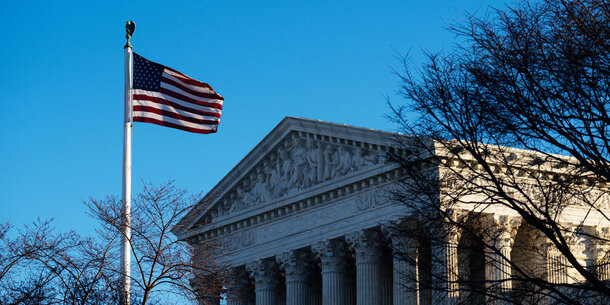Folks who worry about dark money in politics like myself have been waiting with bated breath for the Supreme Court to decide Americans for Prosperity Foundation v. Bonta. The organization’s lawyers argued that California can’t find out the donors to secretive nonprofits like the Americans for Prosperity Foundation, which was founded by the Koch Brothers.
The Court ruled against the state and discounted its given reason for demanding donors’ names, which had to do with preventing fraud in charitable fundraising.
This is not a campaign finance case, but opponents of political transparency will likely try to use it to foreclose efforts to counter the dark money problem in campaign finance. Whether they will succeed is another question.
In American elections over the past decade, there has been a growing problem with dark money, which is spending in elections that cannot be traced to its original donor. Dark money becomes untraceable when it is syphoned through an opaque nonprofit like a 501(c)(4) social welfare organization or 501(c)(6) trade organization. Open Secrets estimated that there was nearly $1 billion in dark money in federal elections between 2010 and 2020, plus an additional $1 billion in undisclosed money spent in the 2020 election alone.
Some nonprofits have very complex structures, with a 501(c)(3) charitable arm, a 501(c)(4) social-welfare arm, and even a 527 purely political arm. Americans for Prosperity is a 501(c)(3) charity. So technically it is not allowed under IRS rules to intervene in any partisan election without risking its tax exempt status.
Meanwhile, California had a rule that all charities soliciting funds in the state need to confidentially report their donors to the attorney general’s office so that the state can root out potential charity fraud. California required this disclosure from Americans for Prosperity, which sued stating that the law violated its First Amendment rights.
The organization made this First Amendment argument relying on case law from the 1950s known as the NAACP line of cases. The most famous of these is NAACP v. Alabama, in which the Supreme Court halted a state requirement for the organization to divulge its membership lists when naming names could have endangered the lives and livelihoods of NAACP members. The threat at that time, 63 years ago when civil rights leaders were being assassinated, was quite real.
Americans for Prosperity argued to the Supreme Court that its donors were at risk of harassment if they were publicly known or if even just California administrators knew their identities. Harassment is a far cry from the death threats, physical violence, and murder that members of the NAACP faced during the 1950s and 1960s. Nonetheless, the conservative majority ruled that California’s disclosure requirement is facially invalid because it burdens donors’ First Amendment rights and is not narrowly tailored to an important government interest.
In the new case, the plaintiffs challenged California’s disclosure rules both facially and as applied to them. An “as-applied challenge” would leave the rule intact but would excuse the plaintiffs — and only the plaintiffs — from the rule. By contrast, a facial challenge to a law argues that the law is unconstitutional in all circumstances and asks the Supreme Court to invalidate the whole law. In Thursday’s decision, the Court went broad and concluded that “California’s blanket demand for [charities’] Schedule Bs is facially unconstitutional.”
Americans for Prosperity Foundation is akin thus to Citizens United v. FEC, which could have been a narrow ruling about nonprofits or documentary films, but rather was used as an opportunity for the Court to write broadly and thereby grant multinational corporations the First Amendment right to spend an unlimited amount of money on political ads.
The Americans for Prosperity ruling moves the goalposts on how to measure the constitutionality of disclosure laws. The biggest doctrinal changes in Americans for Prosperity are that the justices have bumped up the requirements for “exacting scrutiny.” Before this, exacting scrutiny was more akin to intermediate scrutiny in Equal Protection cases, which required a “substantially related” standard. But after this case, exacting scrutiny is going to require the government to demonstrate “narrow tailoring” when it defends disclosure laws. This will be more onerous for states to do going forward when regulating charities.
The Court found that California has an important state interest in preventing fraud by charities, but the state failed to meet the high “narrowly tailored” test for why obtaining charities’ donors lists would serve this interest. As Chief Justice John Roberts wrote for the majority, “The upshot is that California casts a dragnet for sensitive donor information from tens of thousands of charities each year, even though that information will become relevant in only a small number of cases involving filed complaints.” In other words, the Court found that that California’s approach was overbroad and thereby violated the First Amendment right to freedom of association.
Again, it’s important to note that Americans for Prosperity was not a campaign finance case. However, in various campaign finance cases, the Supreme Court has heard NAACP-style arguments about the right to anonymous political association and has brushed them aside for 45 years. In Buckley, McConnell, Citizens United, and McCutcheon, the court has found that voters’ interest in knowing who is bankrolling politicians outweighs any countervailing argument for campaign donors’ anonymity.
Transparency opponents will almost certainly try to use Americans for Prosperity to undermine these rulings to some degree. As Justice Sonia Sotomayor predicted in her dissent, “[r]egulated entities who wish to avoid their obligations” will attempt to do so by “vaguely waving toward First Amendment ‘privacy concerns.’” Still, to be successful, such future challenges would have to overcome the compelling state interest in transparency that the Court has recognized repeatedly in the campaign finance context. Several justices who were in the majority in Americans for Prosperity also joined these decisions or have issued other rulings recognizing the value of campaign transparency, so even now these laws remain on relatively firm constitutional ground.
That being said, the reality is that dark money already relies on opaque nonprofits to hide the identity of its true sources. Americans for Prosperity makes it easier for the ultra-wealthy to hide their role in bankrolling politically active charities. What we don’t know is the extent to which this new precedent will be used to undermine campaign finance disclosure rulings from the past 45 years.
The views expressed are the author’s own and not necessarily those of the Brennan Center.



